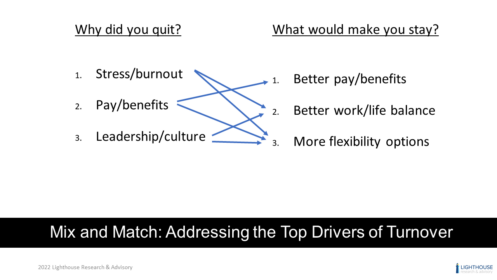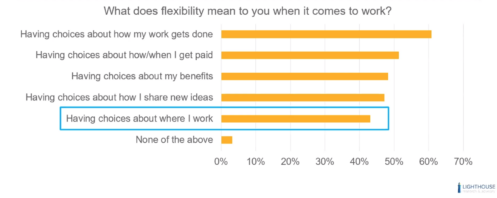INSIDE THE 
NEWS + ADVICE
How to Retain Employees and Keep Them From Quitting

It’s a fact of life that people change jobs and often move to wherever the grass is greener. If everyone stayed with their first employer indefinitely, recruitment would look very different.
Though attrition is a very common phenomena, cleared employers have been feeling added pressure by the tight job seeker market, candidates leaving for remote opportunities or commercial sector salaries, and the use of intimidating catch phrases in the media like “the Great Resignation.”
But it’s not all doom and gloom. The last couple of years have brought some new challenges, but there’s still steps that can be taken to improve retention. First and foremost, let’s discuss some of the reasons employees quit and what can make them stay.
Three Reasons Employees Quit
If you want to improve retention, you first need to ask yourself what is causing your workforce to leave. In a conversation on our podcast series, Security Cleared Jobs: Who’s Hiring & How, Mike Giovanetti, Talent Acquisition and Retention Director at Axiologic Solutions noted, “How do I prepare my candidates that are coming in the door for the reasons that they may be looking to leave down the road? Are they leaving for more money? Are they leaving for more opportunity? Can we as an organization do better about listening to the employees to find out why they’re leaving?”
These are questions we should all be asking if we want to improve our retention efforts. To dig deeper into Mike’s question about why employees leave, let’s look at some data from Lighthouse Research & Advisory. Their recent findings state the top three reasons people quit are:1
- Stress/burnout
- Pay/benefits
- Leadership/culture
On the other end of the spectrum, when asked what would make them stay, the top three responses were: 1
- Better pay/benefits
- Better work/life balance
- More flexibility
The best solution for one employee won’t necessarily be the key to retaining the next. In a podcast episode with Jen Riemenschneider, the Talent Acquisition Director for the SAIC Space Business Unit, Jen shared, “Compensation is obviously critically important, and we certainly offer competitive packages. We realized that’s not the only thing that’s going to help us at SAIC to attract and retain the best talent. We need to deliver what our employees need today and in the future.”
Keep in mind that what an employee needs to stay with your organization is affected by what makes them want to leave. In the Lighthouse Research & Advisory graphic1 below you’ll notice that the best solutions are directly tied to why the person would quit. For instance, better pay and benefits won’t make someone stay if their motivator for leaving is stress and burnout.

The good news is, each problem listed above has a solution to reduce the likelihood that someone will quit. What’s most critical is being able to define the problem so you can pick the most efficient solution to combat your specific retention challenges.
Does Flexibility Equal Remote Work
We hear the word flexibility come up constantly these days – fittingly so, it made it in the list of three things that would make an employee stay. But what does this mean for cleared employers?
We asked over 1,000 cleared job seekers if they would consider positions that don’t require their security clearance when looking for a new job. The vast majority of survey respondents said they were willing to take non-cleared positions. Here’s the full breakdown of responses:
- 15% – No, I want to continue to support the mission
- 25% – Yes, if it’s a remote job
- 60% – Yes, open to all opportunities
While a desire to support the mission may be enough to keep 15% of cleared employees in your cleared pipeline, 85% would be willing to leave the cleared community for remote work or some other enticing opportunity. On the bright side, we know people want flexibility.
But is “flexibility” interchangeable with “remote work?” If that’s the case, that might be a problem for cleared roles that can’t support remote work options, right? You can let out a sigh of relief because flexibility means different things to different people.
Lighthouse Research & Advisory’s Ben Eubanks shared findings that show the physical location of where people work is not the end all be all. If you look at the graphic below, you’ll see that “where I work” is actually below other definitions of flexibility.

So if the nature of your contracts require employees to be on-site, not all hope is gone for offering flexibility to your workforce. Can you give them more control over how they complete their work or the kind of benefits you offer them?
“Flexibility is hard, especially at the scale of a 26,000-person company, but that’s where our leaders are having those conversations with their employees to see what they need,” added Jen Riemenschneider. “We’re empowering our leaders to really help design what flexibility is for your staff and the employees that work on your team, and customize that to the mission that they support every day.”
Retain Talent with Career Growth Opportunities
Career growth and talent mobility are another important factor when it comes to your ability to successfully retain employees. Lighthouse Research & Advisory research found “67% of workers have left a job sometime in their career because of a lack of career growth.” And “88% of those would have stayed if they had development opportunities available.”2
Mike Giovanetti explains that when employees leave, the issue “sometimes is not quality of hire – sometimes it’s quality of opportunity. The employee at that point may be stellar, but they’re bored in their job. We brought him in because they fit the box and we put them in the box, but then they went a little bigger than the box needs to be.”
That concept sparked Mike’s interest in making sure employees are happy. With retention at the forefront of Mike’s thoughts, he added, “Part of my plan with talent acquisition is to be able to build out a progression for employees – a where you go from here concept.”
Career growth or career mapping might seem a little difficult to pursue when we’re dealing with government contract recruiting. In fact, in a podcast episode with Taryn Lazroff, Lead Intelligence Recruiter with Noblis, Taryn explained, “My experience in this industry with a lot of companies is, if they lose a contract, whether it’s to small business, the contract just ends or whatever it is, a lot of times those people on contract are either going to stay on that contract, or they’re going to look for other opportunities. But not many times can companies retain those individuals.”
Taryn works to combat that issue with Noblis’ Talent Mobility program, which allows managers to reach out to employees who are open to new opportunities, whether their contract has ended or they’re just ready for something different.
“When we’re hiring somebody and bringing on top talent, we want to retain them,” adds Taryn Lazroff. “So that means we want to make sure that they have options. If a contract were to end or if they were to feel burnout, they could go someplace else within the organization.”
Understand the Needs of Your Workforce
A recurring theme to all of these solutions has to do with understanding the wants and needs of your employees. There’s no one-size-fits-all solution to retention. If you want to be successful at retaining your workforce you need to check in with them.
Promote one-on-one meetings to gauge what individuals want and may be lacking. Conduct employee surveys to see what matters to them when it comes to issues like benefits. Find out if your employees are ready to pursue a new challenge and support their career paths. If you take the time to get to know the needs of your workforce and then address them accordingly, your retention efforts will be much more successful.

